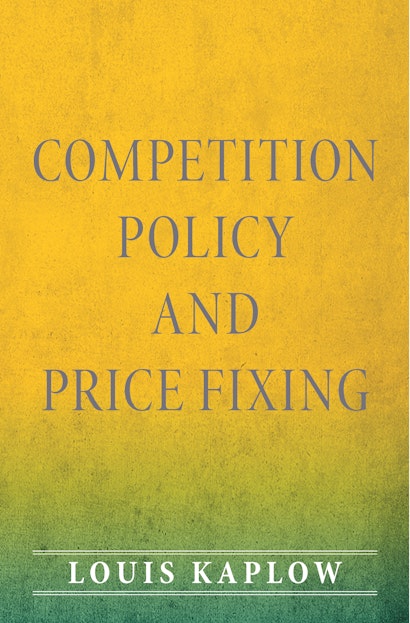Throughout the world, the rule against price fixing is competition law’s most important and least controversial prohibition. Yet there is far less consensus than meets the eye on what constitutes price fixing, and prevalent understandings conflict with the teachings of oligopoly theory that supposedly underlie modern competition policy.
Competition Policy and Price Fixing provides the needed analytical foundation. It offers a fresh, in-depth exploration of competition law’s horizontal agreement requirement, presents a systematic analysis of how best to address the problem of coordinated oligopolistic price elevation, and compares the resulting direct approach to the orthodox prohibition.
In doing so, Louis Kaplow elaborates the relevant benefits and costs of potential solutions, investigates how coordinated price elevation is best detected in light of the error costs associated with different types of proof, and examines appropriate sanctions. Existing literature devotes remarkably little attention to these key subjects and instead concerns itself with limiting penalties to certain sorts of interfirm communications. Challenging conventional wisdom, Kaplow shows how this circumscribed view is less well grounded in the statutes, principles, and precedents of competition law than is a more direct, functional proscription. More important, by comparison to the communications-based prohibition, he explains how the direct approach targets situations that involve both greater social harm and less risk of chilling desirable behavior—and is also easier to apply.
Louis Kaplow is the Finn M. W. Caspersen and Household International Professor of Law and Economics at Harvard University and a Research Associate at the National Bureau of Economic Research. His books include The Theory of Taxation and Public Economics (Princeton).
"[H]is contribution to the debate is novel, provocative, and important."—Choice
"[V]ery well documented. . . . I highly recommend to economists and lawyers, as well as those working in competition policy issues than those in charge of its implementation."—David Encaoua, Journal of Economics
"I highly recommend [Kaplow's book] to economists and lawyers, as well as those working in competition policy issues than those in charge of its implementation."—David Encaoua, Journal of Economics
"Kaplow has produced what is likely to be recognized as the definitive work on price fixing. His analysis is rigorous, comprehensive, lucid, and convincing."—Richard A. Posner, University of Chicago Law School
"Kaplow challenges—with gusto—the very foundations of existing price fixing doctrine. Read this book with an open mind and you will come away questioning basic concepts long taken for granted in antitrust law. Kaplow's analysis is precise and devastating. Prepare to be challenged and rewarded by this brilliant and radical book."—Carl Shapiro, University of California, Berkeley
"This is an ambitious book by a renowned scholar of antitrust law and economics on one of the most important and difficult topics in antitrust. Professor Kaplow demonstrates that current antitrust law for price fixing is fundamentally flawed and provides a fascinating road map for a new approach."—Richard J. Gilbert, professor emeritus, University of California, Berkeley
"This is the most significant book on the law and economics of collusion since Richard Posner's 1976 classic, Antitrust Law. Kaplow offers a well-conceived framework for examining the welfare impact of a price fixing regime and then uses it to produce many important insights. This provocative book will prove invaluable to scholars in economics and the law who work in the area of antitrust/competition policy. It is a must-read."—Joseph E. Harrington, University of Pennsylvania

